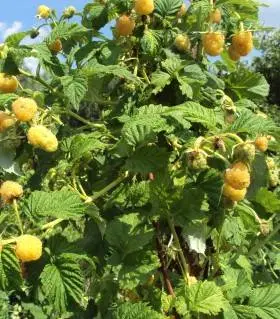Contents
So far, the cultivation of raspberries with yellow berries is not so massive, although there are varieties that can be called favorites. Among them is Raspberry Yellow, which appeared in 1979. Its “parents” were varieties Ivanovskaya and Maroseyka. But the variety was obtained not by ordinary crossing, but by cloning in the laboratory. Trials of the new raspberry with yellow berries lasted 12 years. Only after that, Professor V. V. Kichin and his colleagues suggested that gardeners breed the variety.
Until now, the attitude of gardeners to raspberry varieties with yellow fruits is ambiguous. We will try to dispel doubts, tell you how to grow and care for raspberry bushes.
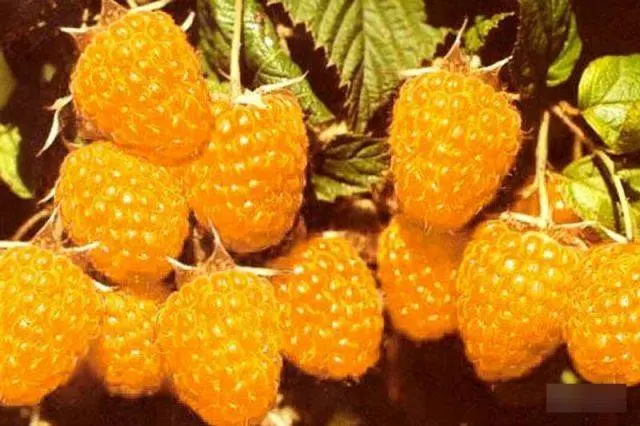
Botanical properties of the variety
When creating new raspberry varieties, breeders are guided by the needs of gardeners: ripening time, disease resistance, taste and the ability to bear fruit for a long time.
Raspberry Yellow Giant, according to the description of the properties of the variety, fully meets the needs of gardeners. This is truly a dietary product rich in vitamins.
Description of the variety:
Yellow Giant belongs to remontant varieties: it bears fruit on the shoots of the first and second years. The shoots of the second year are gray, and the first years are dirty brown. The wax coating on the stems is negligible.
The bushes are powerful, upright, not sprawling. The shoots are flexible, reliable, grow up to 2 meters in height. There are few thorns, but they are prickly.
Large leaves of a rich green variety with clearly visible sharp teeth, wrinkled.
During flowering, raspberries are covered with a white veil, like a bride. This impression is due to the abundance of large white flowers on long peduncles.
Yellow fruits are attached to thick petioles. Each berry weighs up to 8 grams, although there are specimens with a small plum – up to 13 grams. Apparently, this played a role in choosing the name of the variety.
Yellow berries of a classic cone shape: rounded below, with a sharp pipette at the top. The drupes are small, the adhesion between them is tight.
On one side shoot, from 15 to 20 large berries that glow in the sun can immediately ripen. At first, the berries are greenish-yellow, ripened – yellow-orange.
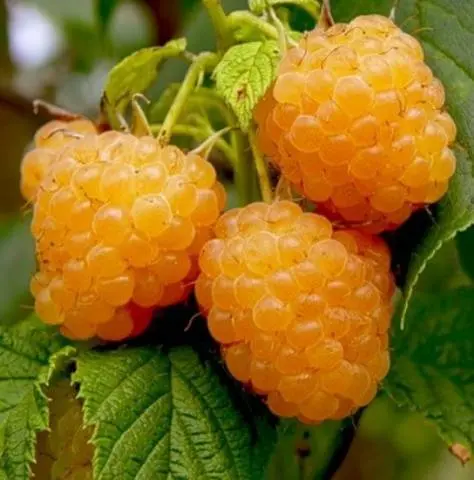
Characteristics
If we talk about the characteristics of this raspberry variety, then it has many advantages:
- The variety is approved by the State Register for the North-West region.
- Large-fruited Yellow Giant fully justifies its name.
- Flowering, judging by the description and reviews of gardeners, is long (starting from mid-July): from one to one and a half months. One bush gives up to 6 kilograms of large yellow berries.
- Refers to varieties with medium early ripening.
- Taste properties are excellent. Sweet yellow berries with a slight sourness are especially liked by children. The Yellow Giant variety was highly rated by tasters – 4,2 out of 5.
- The usefulness of raspberries of this variety is recognized by nutritionists. People with allergies, diabetes, pregnant and lactating women, young children should include yellow raspberries in their diet. The berries (composition description) contain a large amount of sugar, and less acids. This is what provides the sweet taste. Folic acid is more than in other varieties of raspberries. The berry is useful for hematopoiesis and immunity support. The giant yellow fruits contain a small amount of anthocyanins (coloring substances).

- Raspberries of this variety are practically not affected by diseases, they are able to withstand many harmful insects.
- High winter hardiness (up to -30 degrees) allows you to grow a remontant variety in regions with harsh winters.
- Yellow raspberries have a dessert purpose, suitable for making delicious compotes, jellies, syrups, juices.
It is impossible, giving a flattering description of the yellow raspberry, to remain silent about some shortcomings. This would be unethical towards gardeners.
Although against the background of the advantages, the disadvantages do not look so scary:
- Yellow fruits with tender flesh are difficult to transport over long distances.
- The uterine bush is capable of producing a lot of shoots, so during the summer you need to constantly trim.
- The presence of sharp thorns makes harvesting fruit difficult.
- Long rains or prolonged drought adversely affect the quality of the berries.
Rules of landing
As gardeners note in numerous reviews, the yield of bushes depends on planting raspberry seedlings of the Yellow Giant variety.
Site Selection
The description indicates that raspberry seedlings of the Yellow Giant variety need to be allocated a sunny area, protected from the wind. Despite the fact that raspberries love moisture, they should not be planted in places with a close location of groundwater. The optimal direction for the rows of the Yellow Giant, the rows are from north to south. In this case, each raspberry shoot will receive the share of heat and light necessary for development. The site should not be located in a lowland or on a large elevation.
Not only is the soil there very depleted, but even pests can be inherited.
Preparing the soil
Raspberry variety Yellow Giant feels best on sandy or loamy soil. You can check the suitability of the soil like this: after compression, the lump should fall apart, as in the photo. On sandy or heavy soil, caring for raspberries is greatly complicated. If the soil does not meet the preferences of the remontant Yellow Giant, then you will not get a big harvest. Gardeners often write about this in reviews.
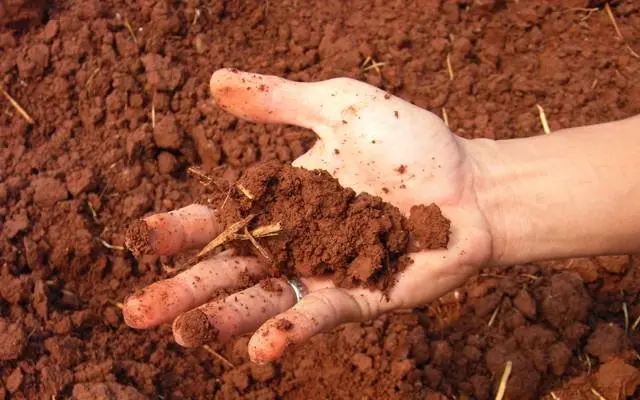
When planting raspberries in the autumn in the ground before digging, you need to add at least 25 kg of manure, 60 grams of superphosphate per square. The soil containing a large amount of peat is diluted with sand, at least four buckets per square meter. Acid soils are not suitable for the Yellow Giant; they can be deoxidized with lime.
As for potash fertilizers, they are applied during spring soil preparation.
Dates and types of landing
You can plant remontant raspberries of this variety both in autumn and in spring. The main thing is not to be late with the deadlines during spring plantings.
The most optimal landing method is trench. The trenches are dug at a distance of at least 1,5 m from each other. The width of the ditch itself for the remontant raspberry variety, due to its strong growth, is about 80 cm. The same distance must be maintained between the bushes.
Before planting, compost and wood ash are added to the trench. Planted raspberry bushes are sprinkled with soil, well shed.
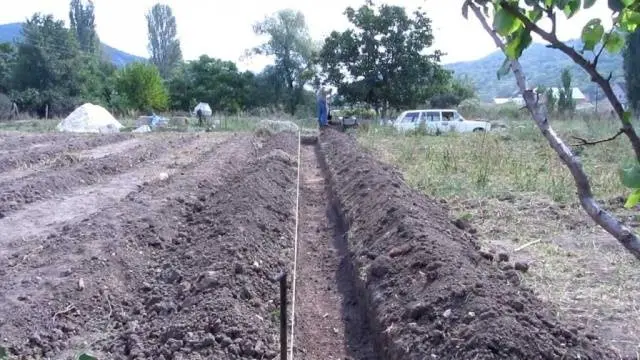
A healthy seedling is a guarantee of a harvest
When choosing remontant raspberry seedlings, you need to pay attention to many nuances:
- The color of the roots should be light, with no signs of disease damage.
- If a seedling with an open root system, then the presence of white roots is mandatory. If the raspberry root system is closed, then the soil must be “stitched” with roots.
- The length of the shoots does not play a special role, because they still have to be cut off.
- The presence of growth buds at the root and 1-3 shoots is a prerequisite.
When planting, they are removed, but you can judge the fertility of raspberries.
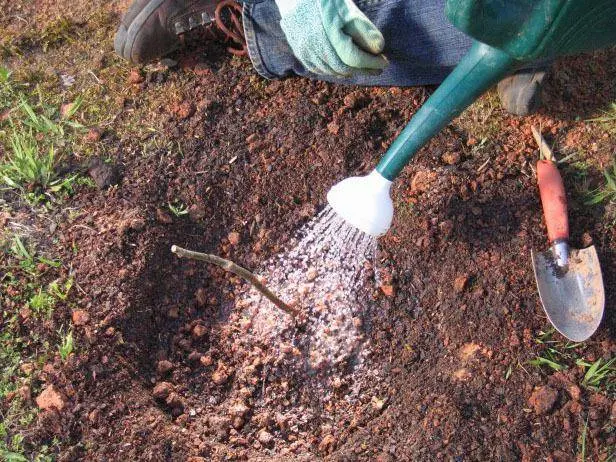
Features of care and cultivation
In fact, remontant raspberry Yellow Giant is no more difficult to care for than other varieties. Proper watering, fertilizing, weeding, loosening the soil – these are, perhaps, all the processes. Although there are still some nuances.
Watering and top dressing
Raspberries love water, but judging by the description and reviews, you should not fill the soil to the state of a swamp. Problems with the root system will begin. Pests and diseases multiply rapidly on weakened plants.
In order for the remontant raspberry of the Yellow Giant variety to fully develop, it must be fed in a timely manner with fertilizers containing manganese, potassium, boron, iron, phosphorus and nitrogen. Fertilizers should be applied during the growing season. As a rule, in the fall in a dry form (the photo below shows how the gardener does this). For spring dressings of raspberries of this variety, fertilizers are dissolved in water.
Yellow Giant responds well to wood ash. It is applied 2-3 times during the summer, sprinkled under the bushes before watering. As gardeners note in the reviews, mulching with humus or compost not only nourishes raspberry bushes, but also prevents weeds from rampaging in the garden.
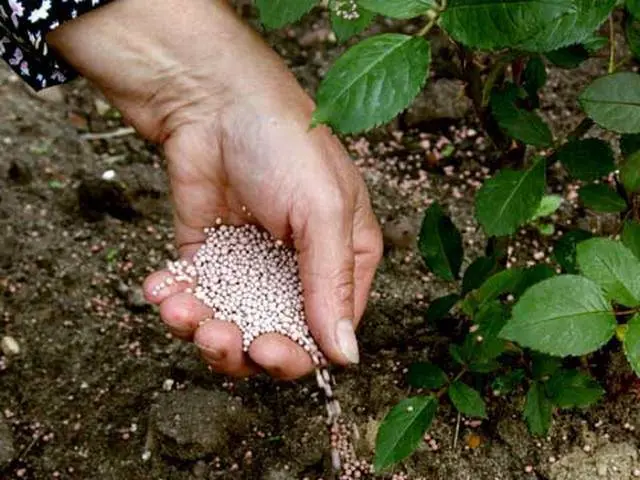
Trimming, garter
During the entire vegetative period, it is necessary to cut out the excess rapidly growing shoots, this was mentioned in the description. If left unattended, the shoots of this remontant raspberry drown out the flowering bushes, deplete the soil, and, as a result, a sharp decrease in yield.
If you grow remontant raspberries with yellow berries in a two-year cycle, then in the spring each shoot must be tied to a trellis. As for the first years, you need to focus on their height.
After all, the yield of raspberries is high, the plant bends under the weight of berries.
Do I need shelter for the winter
The Yellow Giant, judging by the descriptions and reviews, has excellent frost resistance. If you live in regions with a mild climate and abundant snow, then you can not insulate remontant raspberries, just sprinkle the root system with humus. In order for the plant to survive the harsh climate, you will have to dig in.
Since harvesting is possible on annual and biennial shoots, preparation for winter will be different:
- If raspberry shoots are left for next year, they are bent down, tied into bundles, covered with non-woven material and covered with sawdust or dry earth.
- With the annual cultivation of the Yellow Giant, all shoots are cut out, and then they are covered in the same way.
Work is carried out before the onset of frost.
vermin
As already mentioned in the description of the remontant raspberry variety Yellow Giant, the plant is little affected by pests and diseases. But since different varieties grow in the garden, it will not be possible to completely avoid problems.
Most often, raspberries are harmed by:
- raspberry beetles;
- raspberry fly;
- spider mite;
- raspberry moth (larvae).
Treatment from pests should be carried out not only during the period of mass destruction of plants, but also for prevention, before flowering. Most often gardeners use:
- Karbofosom;
- Confidor;
- spark;
- Fufanon.
As gardeners write in reviews, pruning shoots at the root, loosening, timely treatments with drugs will help prevent insect invasion and the appearance of diseases.
Yellow Raspberry Benefits:










